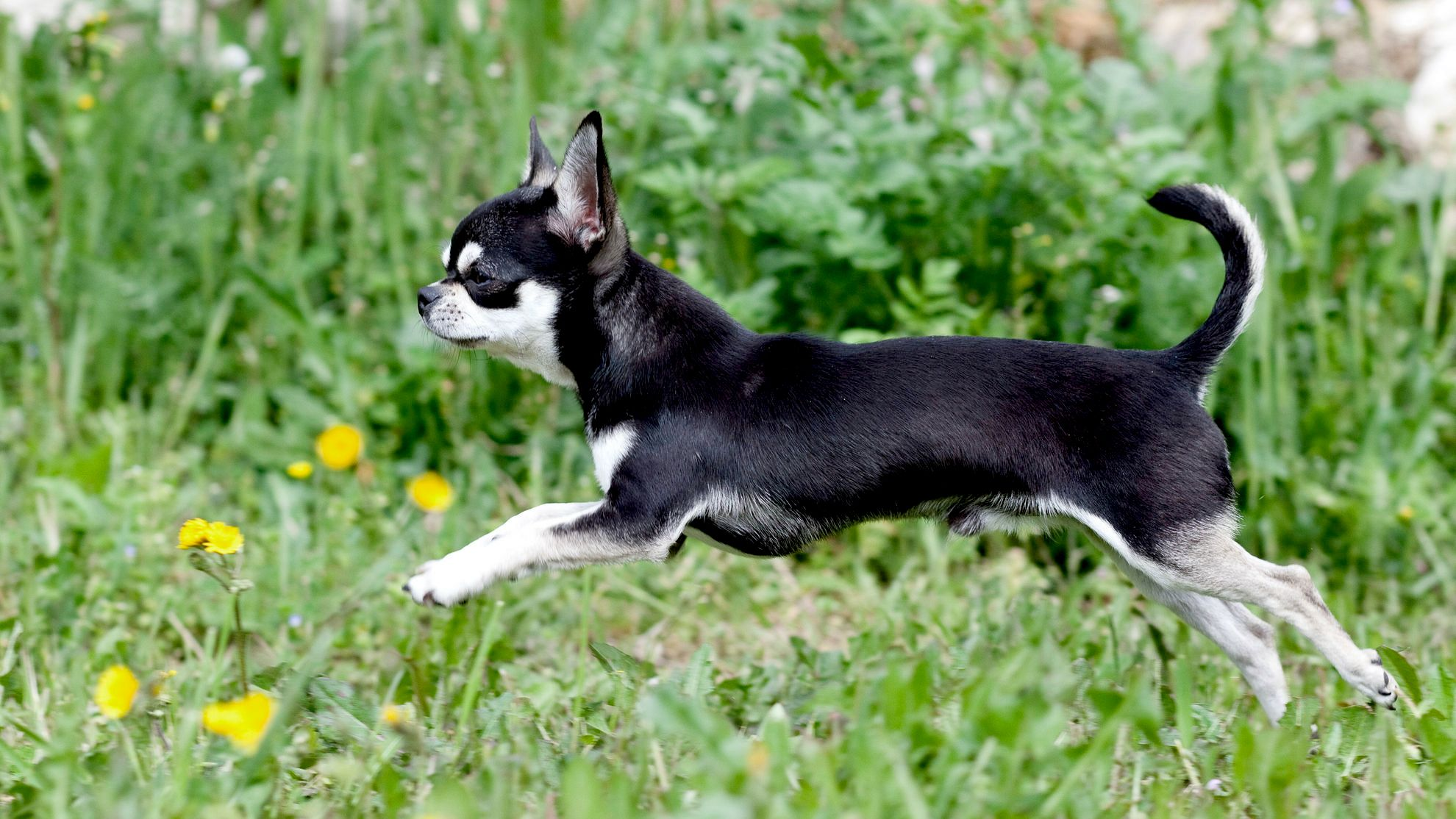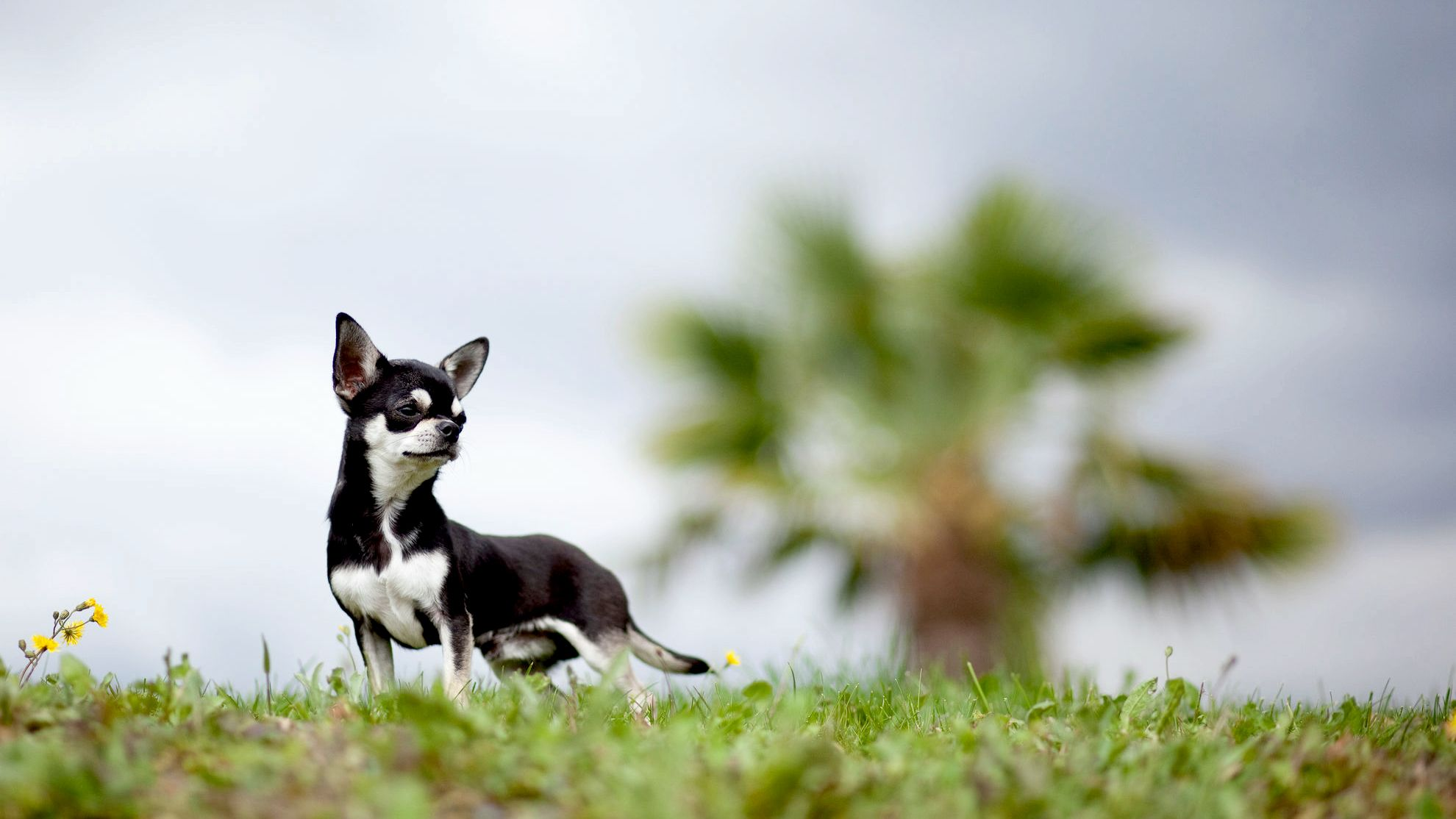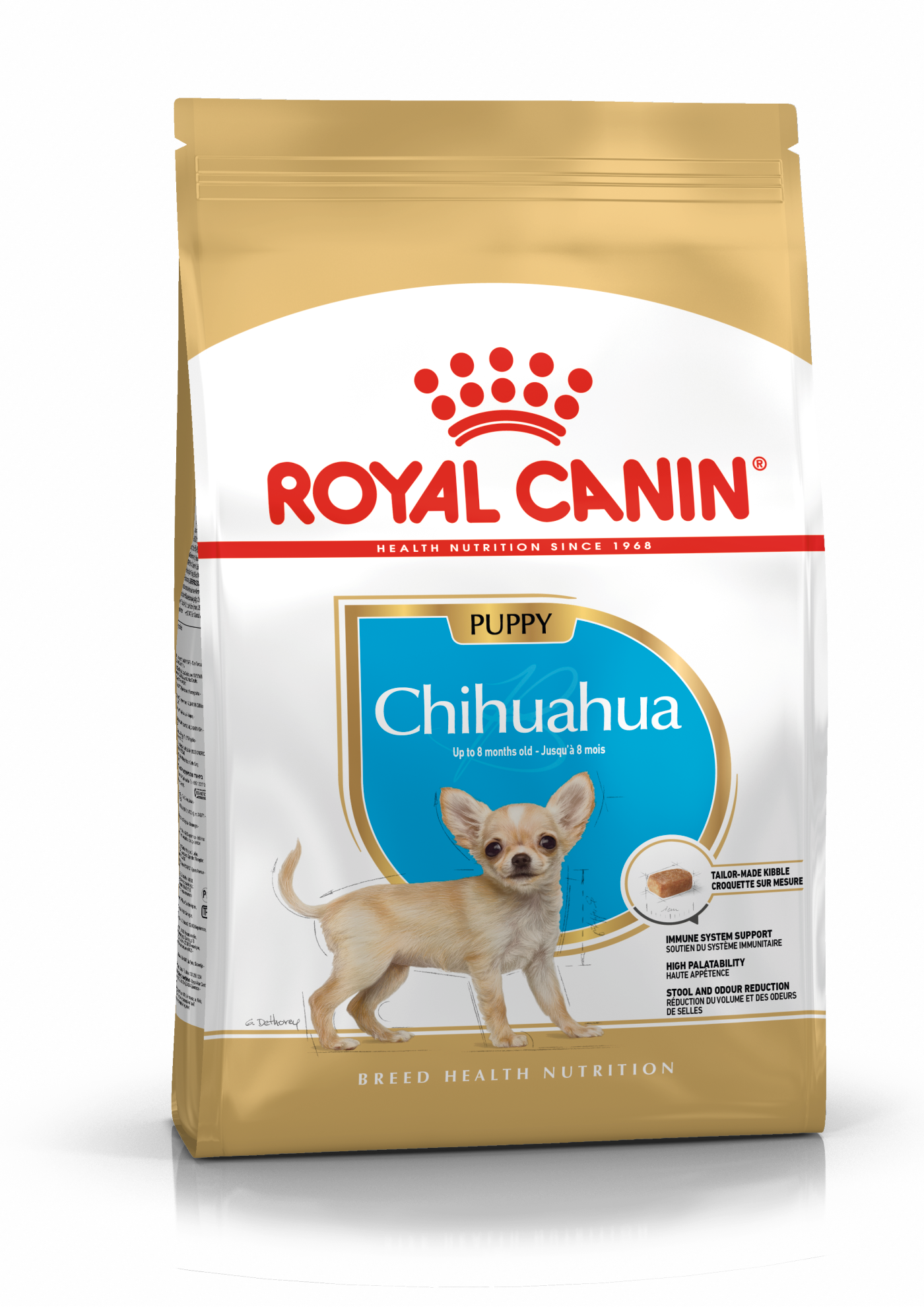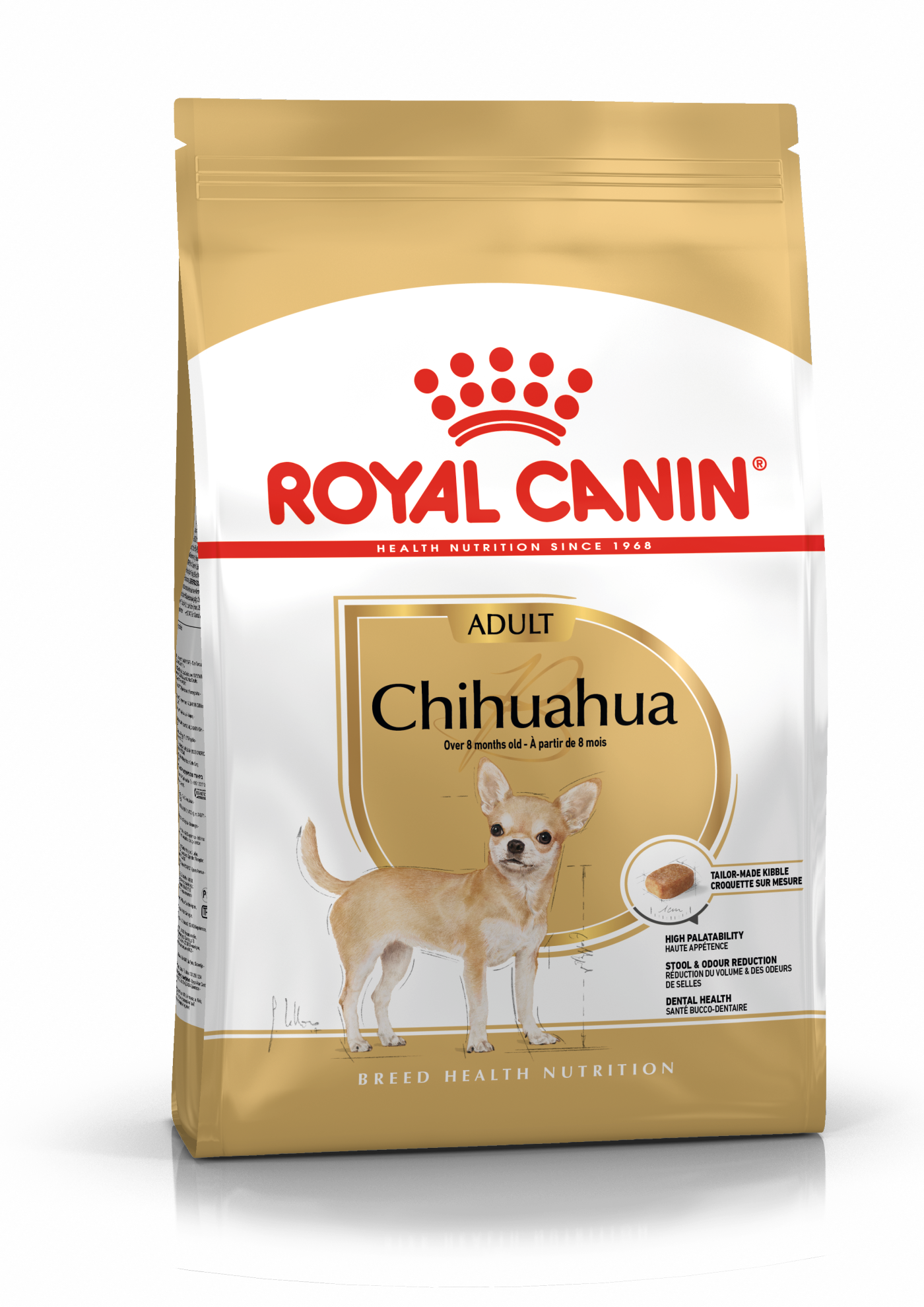Chihuahua
| זכר | נקבה |
|---|---|
| גובה | גובה |
| 12.7 - 22.86 cm | 13 - 20 cm |
| משקל | משקל |
| 1 - 3 kg | 1 - 3 kg |
| זכר | נקבה |
|---|---|
| גובה | גובה |
| 12.7 - 22.86 cm | 13 - 20 cm |
| משקל | משקל |
| 1 - 3 kg | 1 - 3 kg |

Get to know Smooth-Coat Chihuahua
All you need to know about the breed
“Best buddy” is the ideal phrase to describe the Smooth-Coat Chihuahua, the ideal companion dog. Loyalty is a given for a breed that easily cosies up but is always on alert where their owner is concerned. Barking at strangers may happen with the Chihuahua but it’s hardly cause for concern. They’ll soon be diverted by another nonstop activity. Playtime is anytime as far as they’re concerned!
The power-packed personality of the Chihuahua breed is evident in their official ranking: They currently hold 11th place on the American Kennel Club’s annual list of most popular breeds.
The breed never grows past 3 kilograms - 6 pounds - so taking them pretty much anywhere is doable.
When it comes to dogs, we’re often advised to watch children for fear that the dog may hurt them unwittingly. But because this breed is so small, children are the ones who could actually harm the Chihuahua without meaning to. They can be fragile so keep a watchful eye. Indoor play is ideal as are small dog parks. Mental stimulation is great for the Chihuahua breed, and games are an ideal pastime, too.
Far from being a hulking security dog, Chihuahuas can be just as protective of their flock. They tend to be reserved with strangers, but this wariness falls away once a new relationship is formed.

2 facts about Smooth-Coat Chihuahuas
1. Don’t spoil them too rotten
Believe it or not, Smooth-Coat Chihuahuas can gain weight easily. With a wee body, one too many snacks can quickly add up. Use a handful of kibble as a treat, taken from their daily meal allotment. The official breed classification puts the Chihuahua at 2.72kg, tops.
2. So small in a big world
The Chihuahua personality is a bold one for sure: Not to be dismissed, they’ve been known to challenge dogs multiple times their size. Teaching your new dog a new trick - how to get along with others - will be key to proper socialising as they grow.
History of the breed
Many wonder where the diminutive Chihuahua comes from. The dog hails from 12th-Century Mexico during the time the Aztecs conquered the Toltec civilization, and the Techichi dog, a denser ancestor of the Chihuahua breed. The Techichi was lighter and more agile than the current Chihuahua size, if that’s even possible for such a petite breed of dog.
Throughout the centuries, the Chihuahua persevered, eventually gaining huge popularity in the U.S. in the mid-1800s when Americans discovered them in their area of origin, Chihuahua, the Mexican state that borders Texas. The Techichi was then renamed and the Chihuahua breed flourished north of the border.
Smooth-Coat Chihuahuas can be clannish, tending to stick with their own kind. Not bred for a particular job, Chihuahuas function best as a family dog and of course make a superb traveling partner. For that, they’re just the right size: The Chihuahua dog breed is considered the smallest in the world, maxing out at just over 6 pounds, or 2.72kg.
From head to tail
Physical characteristics of Smooth-Coat Chihuahuas
1.Ears
2.Head
3.Body
4.Fur
5.Tail

Things to look out for
From specific breed traits to a general health overview, here are some interesting facts about your Smooth-Coat Chihuahua
This is one dogged dog
<p>The headstrong Smooth-Coat Chihuahua temperament and willful determination is surprising, given their compact size. But small can still mean mighty when it comes to getting their way. The Smooth-Coat Chihuahua is smart and will outsmart you if you let him! The solution: Early education of your puppy to make sure they know who is in charge. Training your Smooth-Coat Chihuahua well can offset any tenacious streak they may have and instill good behaviour all around.</p>
Too much exercise wears them out
<p>The Chihuahua breed is a high-energy one for sure, but don’t mistake this characteristic for your Smooth-Coat Chihuahua’s desire to take super long walks or play endlessly. A small body means that less is more. Simple indoor activity is best on a daily basis for the Smooth-Coat Chihuahua dog, and they’ll get more mileage out of shorter strolls in the end. And as with all smaller dogs, if they get too tired, you can just pick them up and put them in a carrier the rest of the way home!</p>
Chihuahuas can have a few health issues
<p>Small dog breeds can be prone to hypoglycemia, or low blood sugar. It’s easy to think Chihuahuas’ little bodies don’t need a lot to go on but too-long a stretch between meals and your dog may have a serious dip in energy. Stick to regular meals and food packaging guidelines. The breed can have cardiac concerns such as narrow heart valves or aortic valve disease, eye disease, and patellar luxation (loose kneecaps). Regular vet checkups can stem any problems before they start. They are also known as a brachycephalic breed, characterised by a flattened snout and nostrils. Breathing difficulties - especially in too-hot or too-cold weather - can be common. Many dogs that have brachycephalic airway obstruction syndrome can also show signs of gastrointestinal distress. Take extra care to have your Chihuahua fully examined by a veterinarian regularly.</p>
Healthy diet, healthier dog


The main nutritional goals for adult Chihuahuas are:
Maintaining an ideal body weight by using highly digestible ingredients and keeping the fat content at a sensible level
Preserving the health and beauty of the skin and coat with the enriched provision of essential fatty acids (especially EPA-DHA), essential amino acids, and B vitamins.
Protecting their very delicate jaws. Chihuahuas have a strong predisposition to accumulating dental tartar. By reducing tartar formation on the teeth, which is responsible for dental plaque, kibble containing calcium chelators plays an essential role and helps combat oral disorders. The size and shape of the kibble should be very small and adapted to the miniature jaw of Chihuahuas in order to avoid problems with picking up food. This may also stimulate their fussy appetite.
Text Item 1
Text Item 1

After 8 years old, Chihuahuas start facing the first signs of ageing. A diet enriched with antioxidants helps maintain vitality, and key nutrients, such as taurine, help support good cardiac function. Ageing is also accompanied by the modification of digestive capacities and particular nutritional requirements, so food for ageing Chihuahuas should have the following characteristics:
Higher
vitamin C and E content. These nutrients have antioxidant properties,
protecting the body’s cells against the harmful effects of the oxidative stress
linked to ageing.
High-quality protein. Contrary to a widely held misconception, lowering the protein content in food brings little benefit in limiting kidney failure because older dogs are less efficient at using dietary protein than younger dogs. Reducing the phosphorus content is the only way of slowing down the gradual deterioration of kidney function.
A higher
proportion of the trace elements iron, zinc and manganese to maintain good
condition of the skin and coat.
A higher
quantity of polyunsaturated fatty acids (borage oil, fish oil) to maintain the
quality of the coat. Dogs normally produce these fatty acids, but ageing can
affect this physiological process.
As they age, dogs increasingly suffer from teeth problems. To ensure they continue to eat in sufficient quantities, the shape, size, and hardness of their kibble needs to be tailored to their jaw. A formula that contains calcium chelators will support dental health by reducing tartar formation.
Although important throughout the Chihuahua’s life, cardiac health becomes more important as the dog ages. A blend of nutrients, such as taurine and EPA-DHA, will help maintain cardiac health in mature Chihuahuas.
Caring for your Smooth-Coat Chihuahua
Grooming, training and exercise tips
<p>The devoted, smart Smooth-Coat Chihuahua is a delightful dog to have around. An intense loyalty means they’re motivated to please, and will definitely respond well to obedience training. Instilling good habits in your Smooth-Coat Chihuahua from a young age will yield the best results and curb the tendency to be overly assertive.</p>
<p>As a small dog, hikes and morning runs are ruled out, but there is plenty of activity the Smooth-Coat Chihuahua can get up to every day. Like any dog, they need moderate exercise to keep in good health. Short jaunts around a few blocks will work to keep them in good shape. The life expectancy of the Chihuahua is a long one; keep them fit all those years with appropriate activity, like simple play indoors and fun games of fetch.</p>
<p>Keep the coat of the Smooth-Coat Chihuahua in shape by grooming it a few times per week; doing so will help dispose of old hair and make way for new, and keep their coat its shiny best. Shedding is luckily not an issue for the breed. Routine nail trims should be maintained as well as the regular brushing of teeth to stave off any periodontal problems. Daily brushing removes dental plaque but preventing periodontal problems may be best done through the care of your veterinarian.</p>
<p>The devoted, smart Smooth-Coat Chihuahua is a delightful dog to have around. An intense loyalty means they’re motivated to please, and will definitely respond well to obedience training. Instilling good habits in your Smooth-Coat Chihuahua from a young age will yield the best results and curb the tendency to be overly assertive.</p>
<p>As a small dog, hikes and morning runs are ruled out, but there is plenty of activity the Smooth-Coat Chihuahua can get up to every day. Like any dog, they need moderate exercise to keep in good health. Short jaunts around a few blocks will work to keep them in good shape. The life expectancy of the Chihuahua is a long one; keep them fit all those years with appropriate activity, like simple play indoors and fun games of fetch.</p>
<p>Keep the coat of the Smooth-Coat Chihuahua in shape by grooming it a few times per week; doing so will help dispose of old hair and make way for new, and keep their coat its shiny best. Shedding is luckily not an issue for the breed. Routine nail trims should be maintained as well as the regular brushing of teeth to stave off any periodontal problems. Daily brushing removes dental plaque but preventing periodontal problems may be best done through the care of your veterinarian.</p>
7/7
All about Smooth-Coat Chihuahuas
The Smooth-Coat Chihuahua has all the makings of a great pet: a fun temperament, high energy, and affection in large doses. The Chihuahua breed is also great for those new to dog ownership. Let’s face it, there’s not a lot of dog there to handle! Loyalty is a given for the Smooth-Coat Chihuahua and their size makes them great to take anywhere as well.
Smooth-Coat Chihuahuas are not naturally aggressive; if they bark or snap it’s just that - like any dog - their bark at times may be worse than their bite. They may be territorial or anxious, and the breed can also be possessive of their owner. Even though they’re petite, the behaviour shouldn’t be classified as cute; it requires discipline, and doing so will actually help your Smooth-Coat Chihuahua feel comfortable. Rule out any underlying medical conditions as well that may be spurring on their anxiety.
Read more on this topic
Sources
- Veterinary Centers of America https://vcahospitals.com/;
- Royal Canin Dog Encyclopaedia. Ed 2010 and 2020
- Banfield Pet Hospital https://www.banfield.com/
- Royal Canin BHN Product Book
- American Kennel Club https://www.akc.org/